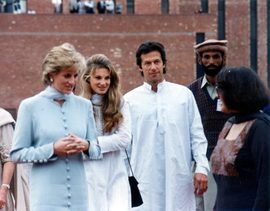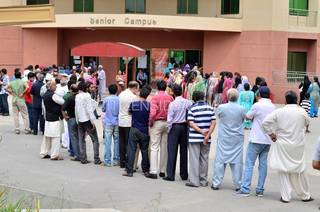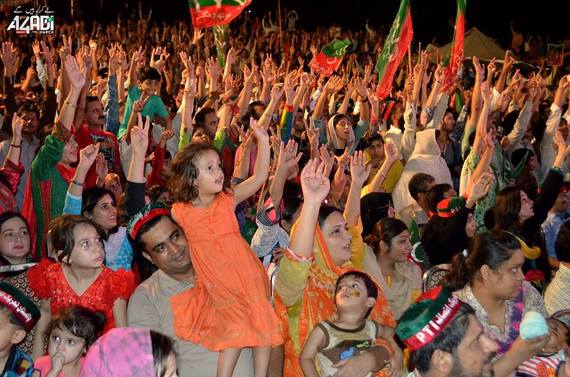There is so much that occupies us nowadays. The new iPhone has been released. Football season has kicked off, coming on the heels of the U.S. Open, which finished earlier this month. ISIS is making headlines internationally, and domestically, the dust has only just settled on the Ferguson affair. Closer to home, school is in full swing. In the midst of all this, it is no wonder that we don't hear about a very different political leader in South Asia who is taking on one of the most draconian, corrupt and inbred governments in Pakistan, asking them to resign and hold a voter recount.
We don't hear about him even though his life story reads like a sensational script for a Hollywood blockbuster.
Imran Khan was a cricketing legend in the '70s and '80s, and not just in his home country but the world over, in countries like the UK, Australia and New Zealand. Though batters used to sway in fear of facing his fast pitches, recorded at 87 miles per hour, women, without exception, used to swoon over his dashing and rugged looks. He was more at home in England, where he'd attended school at Oxford, and where he later married Princess Diana's friend, Jemima Goldsmith.
Following his days as a successful cricketer and playboy, the world may have forgotten him if he had heeded Margaret Thatcher's advice to consider Britain as his home. But life took a turn after he captained the Pakistani team to beat England in the finals and win a nine-country cricket world cup in 1992. After he lifted the cup, he announced his next goal: to create a world-class cancer hospital to treat the underprivileged for free. The hospital, in his hometown of Lahore, was to commemorate his mother, who had died of this disease.
His long trek on the path of philanthropy started with a global fundraising campaign that saw Khan donate all £87,000 ($141,500 in today's rates) of his prize money.
His efforts paid off, and 20 years after the hospital opened its doors in 1994, it remains one of best-run institutions, treating almost 75 percent of patients for free in 2013.
In 2008 Khan went on to create Namal College as an associate college of the University of Bradford in England. The college is in a rural area, and almost 90 percent of its students are on financial aid.
Although the cancer hospital won him accolades at home and around the world, he wanted to make his mark in the murky area of politics.
To say that Imran's political career has been full of roadblocks would be an understatement. In this regard he is reminiscent of Abraham Lincoln, whose political career sputtered many times before it took off. Like Abe, Imran did not give up.
He started his political party, PTI, in 1996, with justice being his party's central theme. Six years later he won a single seat in the National Assembly in 2002. In the 2007 election Khan, the idealist, tore up his nomination paper at a press conference, and his party boycotted the 2008 election, which they believed was laced with irregularities.
In the five years that Imran sat out, as people became disillusioned with the corrupt and self-centered government, his popularity soared. He was the only politician who was beyond reproach. Unlike career politicians who were in it to amass millions for themselves and their families, he genuinely wanted to uplift the common man. As a proud Pakistani himself, he wanted to return pride to his people. People saw his sincerity and took his message to heart.
But life was to challenge him further. Three days before Election Day in May 2013, he fell 15 feet onto solid concrete from a makeshift scaffolding while preparing to address a large crowd. From his hospital bed, a severely injured and emotional Imran appealed to the Pakistani people to turn away from career politicians and vote for a new Pakistan.
The 2013 election turned out to register the highest voter turnout, 55 percent, a 12-percent increase from five years ago. People, young and old, rich and poor, men and women, stood in line for hours to vote for Imran's new Pakistan. But, as is the wont of such proceedings, and as is the sad history of developing nations, the elections were massively rigged in favor of the family-run party of PML-N. Nawaz Sharif, now the prime minister of Pakistan, with the help of the Geo media group, declared himself a winner when only 15 percent of the votes had been counted.
What followed in the next several months was nothing new. Nawaz Sharif's government buried the Pakistani population under the yoke of their fiefdom. His younger brother, Shahbaz Sharif, became Chief Minister of Punjab, the largest and most powerful province. Shahbaz quickly created lucrative government positions for his two sons, but not before Nawaz got his daughter and her husband to take on key government roles as well.
Even though Imran's party emerged as the second largest political force and PTI was able to create a government in the troubled KPK province bordering Afghanistan, Imran Khan embarked to challenge vote counts in four constituencies. He demanded in court to conduct independent investigations of electoral fraud in these four constituencies.
Imran wanted to fight the endemic problem that he saw as the biggest culprit in developing nations like Pakistan: the flagrant stealing of votes to rob people of their mandate in order to put crony politicians in place instead. He appealed that unless a corrective measure was taken, people would become apathetic and the country would remain mired in issues, never allowing it to become a mature and self-sustaining nation.
After a year of legal proceedings turned up naught, Imran decided to awaken the same population on whose shoulder Nawaz Sharif claimed to have come to power. It would be the ultimate litmus test. If his was a genuine struggle, people would rally around his cause; otherwise he would stand alone.
Last month, on Aug. 14, he started on his 200-mile trip from Lahore to Islamabad. A few hundred marchers became a few thousand very quickly. They arrived in Islamabad in droves: the old and the young, the rich and the poor, the conservatives and the liberals. People sang songs, danced to tunes, prayed, ate and generally hung out. They've carried out this peaceful sit-in ever since.
The incumbent government started out by trying to block people's path to the sit-in, but they did not succeed. Then they tried to align themselves with opposition leaders whom they had once avowed to bring to courts. Then they tried to wait the protesters out, but they lost patience when the sit-ins started in major cities in Pakistan. Finally they opened fire on women and children one dark night, killing 45 (an unofficial count, since no official number was released) and maiming a few hundred. This only strengthened the resolve, and the protests spread world over to the United States, England, Norway, Sweden, Italy and Denmark. Images of Imran Khan and his large protest appeared in the background of Canadian band Nickelback's newly released video for their single "Edge of a Revolution."
It has been over a month now, and the peaceful sit-in still continues. Thousands of peaceful protesters in various cities gather every evening and leave after speeches are done. Even though the government claims massive impacts on business, a few blocks away people wait for an hour to get seated in restaurants, and local shops continue to serve clientele. All this while a lone man and his party stand firm in their demands against a corrupt and inept government.
Imran has given voice to the common man, who can now try to stand up to these paper lions. When Nawaz Sharif visits flooded areas for a photo op -- after ignoring the warnings of the meteorological department -- he is booed by vociferous cries of "Go, Nawaz, go."
Regardless of where we are, we have to decide which cries we want to join!
This is not about a clash of ephemeral political parties that you may not have heard of in a country far away. This is about a timeless issue of standing up to bullies who exert power simply because of their stature. This is about intuitively fighting what seems instinctively wrong without calculating whether your move will bear positive results or not. This is about knowing in your heart what is inherently right. This is not about negotiating a deal that makes most political sense; it is about clinging to your ideals with zero regard for their manifestation.
As the famous Pakistani poet Faiz once wrote, "Yunhi hamesha ulajhti rahi hai zulm se khalq / na in ki rasm nayi, na apni reet nayi" (translation: "Thus always has the world grappled with tyranny / Neither their rituals nor our rebellion is new").
Let's not pick only those fights that we know we can win. Let's fight injustice because it is worth fighting against. Who could have thought that civil-disobedience movements in pre-partition India would eventually see the mighty British Empire, on which the sun never set, resign, give in to peaceful protestors and leave?
As then, so now! Let history repeat itself. Go, Nawaz, go!


